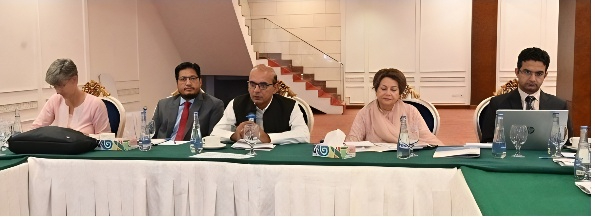Islamabad, Sep 24: During a high-level consultative session on Tuesday, the experts emphasized that all stakeholders must move quickly to implement novel climate smart financing mechanisms because climate disasters are severely affecting the nation’s GDP and community resilience.
In order to explore the crucial role that sustainable finance plays in advancing climate action, parliamentarians, government officials, financial experts, and climate advocates gathered for a consultative session titled “Climate Change and the Importance of Climate Smart Financing,” which was organized by the Center for Peace and Development Initiatives (CPDI) in partnership with the Friedrich Naumann Foundation for Freedom (FNF).
In his introductory remarks, Mukhtar Ahmad Ali, Executive Director of CPDI, emphasized the critical role lawmakers should play in addressing climate change. He noted that although Pakistan contributes very little to global emissions, It continued to be extremely susceptible to its effects.
In order to guarantee that climate-smart policies are put into practice at all governmental levels, he demanded greater political will and bureaucratic reform. The financial cost of climate change to Pakistan was highlighted by Birgit Lamm, Country Head of FNF Pakistan.
She said that the World Bank had calculated that $16 billion will be lost due to climate-related calamities, plunging almost 4% of the population into poverty. Ms. Lamm noted that Pakistan failed to take adequate precautions to lessen the effects of the 2022 floods, which ravaged the same regions affected by the 2010 floods, despite the startling losses and early warnings.
She urged more preventative action to stop climatic disasters in the future. Shaista Pervaiz, a member of the Standing Committee on Climate Change of the National Assembly, acknowledged Pakistan’s continuous fight with climate difficulties and pointed out that many of these problems were caused by gaps in the law.
She underlined that coordination issues between the federal and provincial administrations had arisen as a result of the 18th Amendment, which gave the provinces substantial new powers. In order to accomplish Pakistan’s climate ambitions, she emphasized the significance of Nationally Determined Contributions (NDCs) and the pressing need for committed financial resources.
Amer Ejaz, CEO of MAHER Consulting, and Rashid Azeem, Chief Green Banking Manager at UBL, spoke on the vital role the financial industry plays in advancing development that is climate resilient. In order to guarantee that climate resilience is taken into account in all investment choices, they urged financial institutions, the government, and stakeholders in the private sector to work together and push the banking industry to embrace green finance models.
Asim Jaffry, Country Programme Lead of Fair Finance Pakistan, and Dr. Majid Bilal from the Indus Consortium offered insights into the real-world applications of environmental, social, and governance (ESG) frameworks and green financing, highlighting the necessity of comprehensive policies that give social equity and environmental concerns equal weight.
At the end of the consultation session, all stakeholders were urged to take action and push for more alignment between public policy, financial systems, and climate goals. It reaffirmed the necessity for Pakistan’s legislators and officials to push for climate-smart policy reforms, guarantee the transparent use of money, and promote dedicated climate financing.
